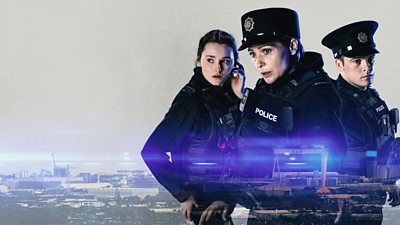
Created and written by Declan Lawn and Adam Patterson, Blue Lights follows three rookie police officers working in Belfast, a uniquely dangerous place to be a police officer.
Grace (Siân Brooke), a mother of a teenage boy, has made the decision in her 40’s to leave her steady job as a social worker to join the Police Service of Northern Ireland. Having previously worked in social care she straddles a fine line between the personal and professional. It’s the biggest gamble of her life, and just a few weeks into the job, she’s making so many mistakes that her decision no longer looks like a winning bet.
Her fellow rookies are Annie (Katherine Devlin), who struggles with the fact that her chosen path may mean having to leave everything she’s ever known behind, and Tommy (Nathan Braniff), who is desperate to prove himself, despite being disastrously inept at the practical side of frontline response policing.
All three are new police officers in their probation period with the PSNI, the odds are at least one of them isn’t going to last. The pressure is immense, but if they succumb to it, they won’t survive. Often the rookie officers don’t know the extent of the peril they are in, or who they can trust. What’s it like to have to hide your job from neighbours, friends and even family? How do you distinguish between who needs your help and who wants you dead simply because of the uniform you wear?
GK
Cast
Siân Brooke - Grace Ellis
Nathan Braniff - Tommy Foster
Katherine Devlin - Annie Conlon
Martin McCann - Stevie Neil
Richard Dormer - Gerry Cliff
Joanne Crawford - Helen McNally
Hannah McClean - Jen Robinson
John Lynch - James McIntyre
Jonathan Harden - David ‘Jonty’ Johnson
Andi Osho - Sandra Cliff
Matthew Carver - Cal Ellis
Michael Shea - Mo McIntyre
Abigail McGibbon - Tina McIntyre
Valene Kane - Angela Mackle
Dan Whyte O’Hara - Gordy Mackle
Nabil Elouahabi - Joseph MI5
Crew
Stephen Wright - Executive Producer – Two Cities
Louise Gallagher - Executive Producer – Gallagher Films
Tommy Bulfin- Executive Producer – BBC
Declan Lawn & Adam Patterson - Writers, Co-Creators & Executive Producers
Francesca Harris - Writer Eps 3 & 4
Gilles Bannier - Director & Executive Producer
Carol Moorhead - Producer
John Wallace - Line Producer
Stephen Murphy & Angus Mitchell - DOP
Ashleigh Jeffers - Production Designer
Daniel Edwards & Georgia Simpson - Casting Director
Maggie Donnelly - Costume Designer
Natalie Reid - Hair and Make-up Designer
Peggy Koretzky & Helen Sheridan - Editors
Cast Interviews
Siân Brooke (Grace Ellis)
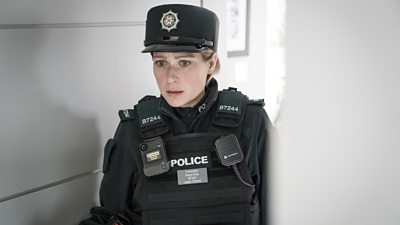
What were your thoughts when you first read the script?
I instantly fell in love with these scripts, Declan and Adam’s writing is quite extraordinary. I’ve always been drawn by character-driven pieces and I think, having both been journalists, it makes them great observers. You can really see that come together in these scripts. We meet these characters in what’s seen as positions of power and responsibility but Declan and Adam show a very personal journey for each of them.
What is it about Declan and Adam’s writing that has tapped into the psyche and culture of Northern Ireland and in particular the PSNI?
The combination of having grown up in NI and having been journalists means there has been a great deal of care in rooting this world in reality and what it’s truly like to do such a job in a city they know so well. I don’t think they shied away from all the facets that make up this beautiful city and it’s a real homage to the city and the people.
Describe how Grace fits into the story of Blue Lights?
We meet her at a moment in her life where she’s made this huge career change from social worker to police officer. I think that decision is hugely informed by the job she used to do and the frustrations of working in that environment. She wants to do a job where she can make a difference and be on the frontline of that change. She has a 17-year-old son and she’s juggling being a mum, a single parent, and learning to do a new, challenging job at the same time. She’s just trying to hold it all together and do the best she can.
How is Blue Lights different from other police dramas?
We often see television dramas with police officers who are experienced and in their prime but what’s lovely about this drama is watching these very different characters enter into a job where they have no idea how it will play out. We see the characters as vulnerable when we usually never think about the police being vulnerable. I think there is something unique and refreshing about it.
What sort of research did you do for the role?
To be honest, I’m a bit of a geek at heart! Each role is like going back to school and learning a brand-new subject. I read hundreds of articles, spoke to police officers and social workers and gathered as much information as I could to build the character. We were lucky enough to visit a PSNI station and talked at length with the officers there. This was invaluable, as they gave us so many insights into what the actual day-to-day life of a serving officer is really like and how it impacts upon their personal life - checking underneath their car each time they drive to work, not being able to tell their children exactly what their job was and the constant shift changes. I remember one of them saying they made so many mistakes the first time, they had to start all over again! The other surprising thing was how heavy the vests were when all the equipment was on - truncheons, radios, batteries, handcuffs, notepads, guns, and then having to leg it after someone at any given moment! Grace and Stevie spend a lot of time in the police car, it’s basically an office on wheels so going out in one of the cars on patrol was a real insight - even things like getting in and out of a car with all the equipment on!
Have you found any ways in which you relate to your character?
Sometimes characters come along that click with you - you can’t totally put your finger on why or how, but they just do. It’s obviously something to do with the writing but Grace just jumped off the page and connected. What I hope the audience find relatable is that even though she’s someone trying to do good in this world, she’s also messy and flawed. I also have a personal connection to the story as my dad was a policeman so it’s a world I was very familiar with growing up. I remember my dad dressed in his uniform every day and him having to be on call and the ingrained responsibility that goes with that role. I especially remember the strong friendships which I think is something that Declan and Adam have caught beautifully.
What’s her relationship like with the other characters in the series?
Grace has the gift of life experience in her previous job compared to Annie and Tommy. She can’t help but take them under her wing. She sees a lot of her younger self in Annie. I loved the relationship that quickly develops between Grace and Stevie. It’s one of the things I cherished in the writing. There is an instant spark between them and because they’ve both been around the block a bit they definitely don’t suffer fools gladly! There is a lightness and banter between them that was an absolute joy to play.
Do you have a favourite scene?
I have to say, riding round in the police stunt cars was a bit special. It’s not something you do every day. You were sat in a car that had absolutely no working functions inside and there would be a stunt driver on top speeding round corners and doing hand brake turns which meant you could have all the fun but none of the responsibility! Perfect!
Do you have any specific memories of working with the director?
Gilles is an absolute wonder, a breath of fresh air from start to finish. He has this boundless sense of childlike curiosity which is totally infectious and allowed everyone to feel like they had the ability to play and therefore do their best work. He’s a gift for an actor.
Nathan Braniff (Tommy Foster)
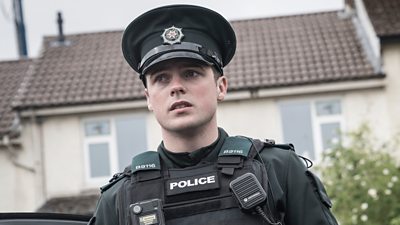
What were your thoughts when you first read the script?
I’ve lived in Belfast for most of my life and that was the main draw for me. First of all that a show like this was being made in Belfast. There have been other police dramas set in Northern Ireland but they haven’t focussed on what makes policing in Northern Ireland so different. It was also nice to see all these little cultural details in the script that Adam and Declan went in to. A lot of times you see things set in Northern Ireland and a lot of the stuff isn’t really real, it’s not what the place is really like. It’s more like an outsider’s perspective. You could tell the first time reading his script that they’re from Belfast and really knew what they were talking about.
Describe the process of being cast in the show and what made you decide to accept the role?
This was my first in-person audition since the outbreak of Covid and before that I had been self-taping. It was just great to get in the room with the director and casting director. The first audition was really amazing and I got a sense that we had really hit it off. But that’s never a given. I came back for a second audition and then got the good news a few weeks after that.
How did you feel?
It was pretty crazy experience. It was near Christmas, my Mum and Dad own a fish and chip shop and I was helping them out one day. I saw my agent was calling me so I went out the back, my mum and dad followed me. He said to me “how would I like the role of Tommy?”, I started screaming, my Mum and Dad started screaming. It was all a bit hectic. I was shaking so much I couldn’t finish my shift so they sent me home. Best phone call I’ve had in my life and one call I’ll never forget, especially with my Mum and Dad being there too. I’ve wanted to do this since I was 10 so to finally get this call was huge.
Can you talk about Tommy being on the fast-track programme?
I think if you have a higher level of education you can enter this fast track programme and it will keep you off the front line and bump you up a bit faster rather than spending time working your way through the ranks. Tommy is a pretty nervous and frightened guy before he joined the police, so the idea of him getting away from the front line as fast as he could made more sense to him.
How does Tommy begin to come out of his shell and build confidence?
His partner and mentor Gerry has a lot to do with that; in fact all of it is to do with Gerry. They spend a lot of time in the car, Gerry is laid back and easy about things, not nervous or scared and that rubs off on Tommy. The first few episodes we see Tommy nervous and unsure. As the series progresses we see him become a bit more comfortable and by the end of the series he really goes for it. Gerry has taught him well. The confidence and the ability to do the job is in Tommy from the start but he just needed a strong figure like Gerry to bring it out of him, to guide him through and make him streetwise.
What sort of research did you do for the role?
Coming from Belfast I was already embedded in the culture and the city’s backstory so I feel I had a good understanding and sense of what the producers may be looking for in the character of Tommy. On a practical level I spoke to some members of the community about their perceptions of the police and had conversations with serving police officers.
What did you learn from this? How did that help you?
From speaking to the police officers in particular you learnt that when you go in to certain areas in Belfast it’s taken for granted that there will maybe be some people that don’t like you and don’t want you there. Which makes policing probably a lot more difficult and makes Tommy a lot more nervous. On a basic acting level you have to heighten your senses, nothing is taken for granted, you should be looking over your shoulder all the time. Doing all the things a police officer would do but even more carefully, more thoroughly. It heightens everything. The sense of danger, the drama for the audience and Tommy’s nervousness.
You underwent some training for the role - what did you learn specifically about being a member of the PSNI from this?
During training for the role we were shooting blanks on the range, and I learned they can still do a lot of damage, you still get the kick back off the gun. That was an eye opener for me. The former-police advisors said their main job was to look out for the community and to help them any way they can. I think that’s what makes Siân’s character (Grace) such a good police officer in the end, she has that experience of being in social care and carrying that across. She’s almost that perfect member of the police to be helping the community.
Did Richard ever make you laugh during scenes?
Thinking back, some of the scenes make me laugh even now. We had a laugh from start to finish, we really did. What was interesting and what worked well in comparison to Richard is that I am an inexperienced actor as Tommy is an inexperienced police officer. It was weird how that connection carried across in real life and then on set. One of the funniest moments during shoots, and I don’t know if they keep this in, but we were driving around having a conversation, the scene was about Gerry’s music, his favourite musician was Kris Kristofferson. In the end they put it on the car stereo and let it play at the end of the scene. I swear by the end of the scene both myself and Richard were singing our hearts out, driving along and just laughing. That was one of the best memories I have of a scene with Richard.
Any particular locations that you enjoyed working on or stunts that you did?
There was so much that was enjoyable but about three or four that stand out. The first one which was still early on the shoot was the police chase where I jump out of the car and chase this guy down the side streets of the city centre and the way they filmed it was amazing. They had three guys on a quad bike with the camera facing me, so I was sprinting around side alleys in Belfast chasing this quad. That was so interesting. All the firearms stuff was amazing, being there doing the real tests and shooting real weapons these guys practice with. Another good one is a scene where Gerry and I have to give CPR, it was really difficult scene to do, to put yourself in the place where it’s life or death. It was quite crazy. We had real life paramedics standing but to make sure we were doing everything right and we had plastic bodies to practice on. That was so interesting to learn and do.
Have you learnt anything specific from the other more experienced cast members?
There was nobody on set that I didn’t learn something from. The more I was on set the more I learnt from them. Richard and I were on set together a lot. There was one point, the director Gilles came to me and said, this is only your first job out of drama school how do you know what to do, why is that? I said I’m just copying everything Richard does, so it worked. I learnt a lot from just watching Siân, Martin McCann as well, he was someone I watched a lot growing up and to actually get to be on set with him. I was just a sponge taking as much of it in as I could. Even if it wasn’t my scene I would be on set watching the monitors to try and soak up all this crazy experience and knowledge from everyone around me.
Katherine Devlin (Annie)
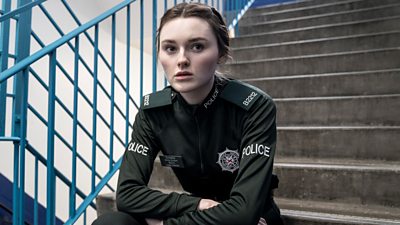
What were your thoughts when you first read the script?
I just loved how both Declan and Adam perfectly encapsulated the energy of people from Northern Ireland and also how complex and distinctive the characters are. Particularly having strong female leads at the forefront is so refreshing to see.
What is it about Declan and Adam’s writing that has tapped into the psyche of Northern Ireland?
It embodies truth. People from Northern Ireland tend to shroud serious situations with humour and we really get a feel for that in the script. There’s also a real honesty in the script to the realities of Northern Ireland in the present day, as we’re still battling issues that have come from The Troubles.
Describe the process of being cast in the show and what made you decide to accept the role?
I was so drawn to the character of Annie and knew instantly what type of person she was because I know women like her. I grew up with them and I still know them. They’re class and like no-other. Also showcasing other parts of the North that aren’t just Belfast is so important. Every place comes with its own spirit and it’s a big part of who Annie is as a person.
Describe how Annie fits into Blue Lights.
Annie is very impulsive as a character and she goes from zero to a hundred really quickly. She’s almost like a walking paradox because even though she is fiery and passionate at times she’s also really soft-centred, sensitive and self-contained. She’s emotionally intelligent and intuitive and she knows how to read people and situations. I think particularly a lot of young people will relate to her as behind the confident exterior, she’s just a young girl trying to figure out life and what she wants. She’s by no means perfect. Drama also seems to follow her around or, maybe she just creates it for herself! She’s always stuck in the middle of chaos.
What sort of research did you do for the role?
In her spare time Annie plays Camogie, (traditionally an Irish Gaelic sport for women) so when I got the role I rang a good friend who is the Captain of a Camogie team, and asked her to share her wisdom! I can’t catch a ball to save my life so I had to be put to work straight away. I listened to a lot of podcasts and interviews and re-read the script a thousand times too.
What did you learn about the practicalities of being a PSNI officer?
The amount of kit they need to wear is overwhelming. I felt like I was putting in a shift at the gym every time I threw it on! How they’re able to run after people, I have no Idea! In terms of personal security, I was taken back by how severe it has to be at times. It’s a real vocation that requires so much commitment. It’s not just a job that you can hang your kit up at the end of a shift.
In what ways do you relate to your character?
I can relate to Annie in a way that she is stubborn and short tempered. I feel like her star sign is Scorpio! But I also relate to her softer side too. She’s a very sensitive, empathetic person, (she may not show it all the time,) who likes to stand up for what she thinks is right, even if she sometimes messes up. She’s also different things to different people, which I get. Nobody is just one characteristic. She’s imperfect but growing and learning new things about herself every day.
What’s her relationship like with the other characters in the series?
At the beginning of the show the dynamic between Annie and Tommy feels like a sibling relationship. They’re both rabbits in headlights but they cope with it differently. Also because of their close proximity in age, they sort of rely on each other and want to protect one another. They’re in it together.
How does Annie relate to Grace, Jen and Helen, those she interacts most with?
In a way I feel like Annie and Jen are similar but neither would want to admit it to each other. They’re unapologetically themselves and not afraid of what other people think of them. However, there’s so many differences. where to even begin. Jen is the type of person that would remind the teacher there’s homework, Annie is the one who definitely didn’t do it and has an excuse lined up. Helen and Annie are chalk and cheese. Annie may think she has all the answers but she’s still so young and naïve at times. Helen keeps her right and is that older, sensible figure. Grace is Annie’s guardian angel. They don’t have a lot of scenes together but quite early on you see two strong women, who are different in ages, looking out for each other in subtle but effective ways.
Martin McCann (Stevie Neil)
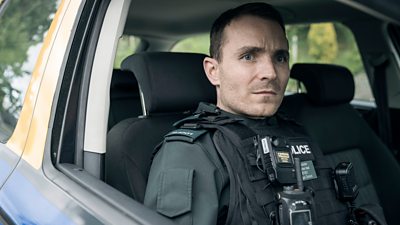
What were your thoughts when you first read the script?
They were refreshing, different and quite revealing. It felt very Northern Irish but many international themes, bit of romance, family issues, work stress and life balance. The scripts were so well crafted, clever and funny but also really deep. It gets heavy when you’re not expecting it and it’s funny when you’re not expecting it. Your emotions are see-sawing and being pulled left and right the whole time.
Describe how Stevie fits into the story of Blue Lights?
In a strange way Stevie is a lone wolf. He’s an introverted extrovert and keeps his private life very much to himself. He’s introduced to this new probationer called Grace who he has to take under his wing, and slowly but surely begins to affect Stevie in ways he wasn’t expecting, changing his outlook on what it means to be a police officer in the PSNI and what it means to do the job that he does.
How is Blue Lights different from other police dramas we see on television?
It’s different in a sense that it reveals the people within the police force in a much more realistic way than I’ve ever seen portrayed before. It doesn’t hitch its wagon to major dramatic or tragic incidents. It does it in a very brave and subtle way that really does make you feel like these people exist and you could bump into them on the street. It does a brilliant job of telling real life.
What sort of research did you do for the role? How exactly was this helpful?
We were very lucky to have a number of retired police advisers on the series, who have previously served as police officers themselves. We also went to some real police stations across Northern Ireland and they took us through the ins and outs of the job. They showed us the briefing rooms, explained what a working day looks like for a police officer, what a quieter day looks like, described the long shifts. It was really great and so helpful to have that insight.
We see Stevie and Grace spending a lot of time in their car – eating lunch, playing music, is this typical of how the police officers spend time in the cars in between the callouts?
This was the surprising thing, crime doesn’t happen non-stop. When it happens, it happens but in-between you spend a lot of time waiting around. There is always work to be done, it is surprising how much paperwork there is to do. When you’re in the car you want to be paired with someone you click with because you’re spending so much time with them. You want to spend it with someone who makes the day a bit easier.
What did you learn about the practicalities of being a PSNI officer?
The uniform is so restricting, I couldn’t think of anything worse to wear chasing a criminal running down the street. They couldn’t have designed anything worse. You’ve got the stab vest, the cuffs, the radio, the guns, the belt is slipping down, it’s almost like a comedy sketch. I will give them this though, the boots are great.
What’s Stevie’s relationship like with Grace?
It’s a great relationship. He trusts her, she’s funny, she brightens up his day and makes it go quicker. She’s teaching him things and reframing his mind in ways that’s benefitting him, he might not want to admit that but she’s a good influence on him.
Richard Dormer (Gerry)
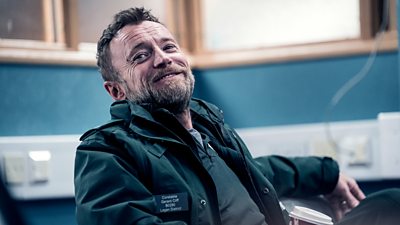
What is Blue Lights about?
Blue Lights is about normal people, they aren’t heroes and they are our neighbours and, like all police forces do, they try and hold society together. It’s a slice of life of these absolutely normal people doing extraordinary things.
How did you feel when you first read the scripts?
It reminded me of Better Call Saul, which I adored for the very reason that it felt like nothing much is happening here – we are just seeing a slice of life but it’s these wonderful characters that are driving the story. The drama is in those moments and the silences for example, in some of the car sequences the silences speak volumes. It’s the back life to those characters that we see in the moments where nothing really happens and they’re thinking. Sometimes we don’t even get to know what they are thinking about but that’s ok because it makes it real and I don’t feel like I’ve seen that before apart from Better Call Saul. I was intrigued when I read it.
What is it about Declan and Adam’s writing that really captured the essence and culture of Northern Ireland?
There’s a real warmth to our language that is pure Belfast; we take the mick out of each other and that comes from having to have a survival technique. Blue Lights is most definitely Belfast and there’s nowhere else in the world it could be other than Belfast. There’s a tangible sense of hope in all of the characters – even the ones that aren’t necessarily likeable. Maybe because I like the accent and recognise the environment there’s a sense of homeliness in the show.
How does Gerry fit into the story of Blue Lights?
Gerry is a veteran of the job. He’s been around a long time and watched all of these guys arrive and watched a lot of people go as well. He’s seen it all, he’s been there and he’s done it. At first, you may think he’s jaded and a bit maverick because he does things a little differently. He’s a realist who knows how to survive. Gerry is the joker in the pack and provides the humour that threads through the station. He doesn’t always play by the rules but he does play by his own moral compass and for him that moral compass is the most important.
How does Gerry’s partnership with Tommy develop?
My backstory is that Gerry is married again to Sandra, who also works at the station. They don’t have children and because of that he basically ‘adopts’ Tommy. We see a lot of jousting and ribbing going on between them – mainly Gerry taking the mick out of Tommy – but he genuinely cares for him as if he was his own. We see Gerry starting to fret about Tommy’s firearm skills and the upcoming tests he has to do in order to stay in the force. Tommy also reminds him of himself when he was a probationer which takes Gerry by surprise at points throughout the series. He doesn’t want Tommy to make the same mistakes that he made or lose those kind and good qualities inherent in Tommy’s nature. The funny thing is that Nathan is actually Tommy. Our cultural references to comedians and music are identical to Gerry and Tommy’s. I’d mention Steve Coogan or Oasis and he wouldn’t know them. He has none of the cultural references that I have so that element of the script is entirely authentic.
How useful was it to have a former police officer on set with you?
He gave me a very useful piece of advice which was to always stand like a boxer stands with your feet at five to two and always at arm’s length when talking to someone. If someone comes towards you raise your left hand up and your right hand lower which is near your gun, baton, pepper spray. He also said that in the police car in between call-outs you would fill time by telling jokes to one another, talking about what you last saw at the cinema, discuss music etc. The mundanity of the day is filled with the same chit chat that everyone talks when they spend time with a colleague.
What makes Northern Irish Humour so unique?
People from Northern Ireland tend to take the mick out of themselves because for so long we have regarded ourselves as second-class citizens. It’s only in the last 20 years or so that we’ve come into our own as a nation really. Writers, artists, actors, musicians all have this indomitable sense of humour and that can also be said for people from the south of Ireland too. We have survived a lot and I believe Declan and Adam really captured that in some of the characters – Gerry being one of those. As a nation we survived all that we went through with a sense of humour, strength and fortitude. Everyone over a certain age from Northern Ireland has suffered some form of PTSD because we will all have experienced a bomb or a shooting or know someone who has died or been injured as a result of the Troubles.
I didn’t take television roles for 20 years because I didn’t want to play a terrorist and then I made Good Vibrations where the character of Terri Hooley rises above the Troubles. I don’t want to play characters that remind people of the Troubles which is why Blue Lights is a big step forward.
Joanne Crawford (Helen McNally)
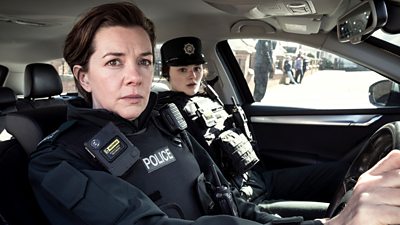
Describe how Helen fits into the story of Blue Lights?
It’s such a lovely character to play and we don’t really know much about Helen other than her life in the station. She is tough on the probationers because she knows what the job entails and the type of person who suits it. She is a mentor and minder. Even though the first time we see her she’s telling people what to do, she’s not just throwing her weight about - she’s trying to find the right path for these probationers. Her life is very much in the station so every decision she makes is very much about the people. For me I think she’s about the job rather than the career which is different to others around her.
What sort of research did you do for the role? How exactly was this helpful?
Our director, Gilles (Bannier), sent some wonderful documentaries that were very useful. On set we had an ex RUC/PSNI officer as our advisor, which was such a gift. You’re really in unknown territory in terms of the way people speak to each other; what can be casual and what can be authoritative. It would be very firm but calm and a lot more engaged. We see a separation between those in uniform and those in plain clothes and the whole process of unpicking what a uniform stands for was fascinating. Our advisor really helped us with that nuance.
Describe Helen’s relationship with Annie and why she feels a particular affinity with her.
Whatever haphazard way Annie approaches things Helen sees someone who is brave and has a particular determination. Just like Helen, Annie is interested in the job. She’s brave, grounded and will engage with what is going on around her. Helen sees herself reflected in Annie.
How was it working with the director, Gilles?
It was truly wonderful to work with our director, Gilles Bannier. His impact on the piece is immeasurable. He was so gracious and kind to work with and it was so surprising to me to hear a French person speak with such love, knowledge and respect for Northern Ireland. On set his talent as a director was endless, detailed and comprehensive. Every department loved working with him and that sense of pride, love and going the extra mile fed into every aspect of the show.
Hannah McClean (Jen Robinson)
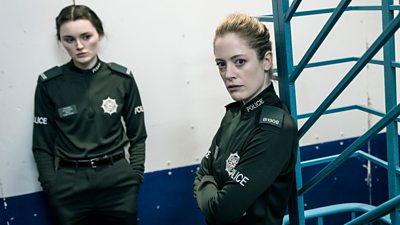
Who is Jen Robinson and how does she fit into the story?
Jen is a police constable who has gone through her probationary period and is about two years into the job. She likes to lord that over the recruits to show she is a bit more established than they. She is from a police family – her mother is Chief Superintendent – and she fell into the job getting on the fast track programme. We discover that she is actually quite work-shy and doesn’t like going on patrol. She would much rather sit at her desk and do paperwork but it appears that is all a front and she’s actually terrified. Her first two years on the job were too much for her to handle and as a result, she’s made some bad decisions in an attempt to make her life easier but she ends up making it worse.
Did you have weapons training?
During the prep period we had someone come in to show us how to use the firearms. We didn’t have to know how to use them exactly but it was essential to know how to hold them, and look like we knew how to use them and that included using handguns and semiautomatic rifles. It felt so odd to hold a gun. I’ve lived in England for ten years now and patrol police over here don’t carry guns so it is odd to go home and see police carrying firearms
Why do you think it’s the right time to tell a story about policing in Northern Ireland?
I don’t think we’ve ever had a television drama that is a true reflection of modern-day policing in Belfast. You get a feel of what it’s like to be from Belfast. It’s not about the Troubles but of course there’s an element of history that cannot be rubbed out of our DNA. Anywhere with a history of conflict is going to have that but it adds to the uniqueness of the drama.
John Lynch (James McIntyre)
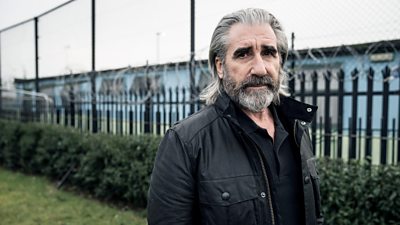
What is the story of Blue Lights?
Blue Lights is focused around the story of three rookie cops and it follows these three new recruits while they enter a relatively recent established system of policing in Northern Ireland. It also encounters the monolith from the past; the history that’s still there underneath the surface, like grudges, drugs, violence and the Troubles but it has this wonderful, clever script that tackles modern policing in Northern Ireland in a different way. You really feel for these young cops as they go into what turns out to be very dangerous situations and in particular a situation that involves my character and how he lives, functions and how he controls West Belfast. To the police, McIntyre seems to have an invisible force field around him and the police can’t touch him - that’s the story that underpins the series. Why is he seemingly untouchable? Why can’t they bring him in?
How do James McIntrye and his family fit into the story?
McIntyre is a bit of a conundrum and you spend the first few episodes thinking he’s one thing and the rest of it knowing he’s another and he’s got a huge secret that is hidden from everyone except his wife Tina, played by Abigail McGibbon. What’s also really interesting about this series is the choice of French-born Gilles Bannier, to direct which was inspired because he brought a unique sensibility and fresh perspective from someone who doesn’t come from Northern Ireland. There could have been a way of telling McIntrye’s story that was clichéd – the typical bad guy – but we wanted to give him and his family some validity and wanted to find as many human frailties in him as possible behind the bravado. We concentrated on the family and moved out from there.
How did you build the McIntyre family dynamic?
All of us Michael Shea, (Mo), Dane Whyte O’Hara (Gordy) and Abigail (Tina) wanted to consider what was at stake for the McIntyres. We wanted to create this credible, extended, dysfunctional family that was struggling to be heard and be of emotional value to each other. There are scenes later in the series between James and his son that see him trying to break from the hard man image and his lack of emotion. As an actor you want to build a character that can say those words in that place at that time and make him as three dimensional as possible. I grew up in the Troubles and I’ve played a lot of characters over the years to do with the Troubles and been around a lot of hard men, a lot of those men I’ve drawn upon for the character.
What drives McIntyre to do some of the things he does?
McIntyre’s rage comes from a place of self-loathing and anger and this is directed at his son when he ignores his orders. A man that lives the kind of life he leads has to hate himself to a point. He’s poisoned inside. He takes pleasure in exercising his power and isn’t shy about intimidating people or putting his foot through a door. He’s a complex man and if you pushed him he’d come out swinging punches.
Jonathan Harden (David ‘Jonty’ Johnson)
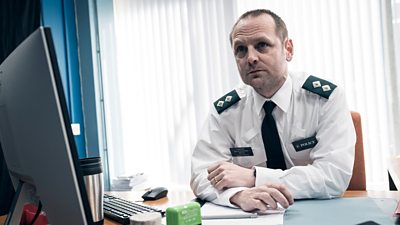
What were your thoughts when you first read the scripts?
I loved them. I felt like I was reading a true depiction of Belfast, of my city on screen. It was effortlessly real. It was my first time reading a Belfast script that felt compelling and real and above all was itself. It does it brilliantly.
How is Blue Lights different from other police dramas we see on television?
Belfast plays a big part in that. It feels like we’re meeting the city for the first time even though people think they know Belfast. You see the cops on patrol, in the precinct, we see them at home and I think that’s the key to the show, it strikes a really good balance between the procedural aspect and the drama and relationship side of the show. It has a really good measure of Northern Ireland humour too, which is hard to do alongside heavier stuff, which is what Declan and Adam have done so well. People call it gallows humour but the heavier the going, the lighter people need to be to get through it. Belfast is a city where people have seen the absolute worst of times so gallows humour is very much a local skill set, we’re very good at that. That is part of the character of the show. We’ve seen other capital cities before, countless police shows all over the world, but I don’t think we’ve seen Belfast like this, our history and our politics means things work slightly differently here and Declan and Adam haven’t shied away from that. That is what’s unique about the show, the foibles of policing a place like the north of Ireland, a place with its complexities.
Coming from Northern Ireland what is particularly refreshing or rewarding about working on this show?
What was refreshing is that they’ve gone for a cast that an audience might not have seen before and I don’t think that is that common. Particularly on a show that doesn’t have an obvious hook so we don’t have a huge lead actor that an audience necessarily recognises. This show just side steps that whole model and focusses on what is the best way we can deliver this project. There are some really talented young actors from here that an audience will be discovering for the very first time and that is always an exciting thing for an audience. It’s even more exciting than seeing a well-known actor do something different. It feels more real, there’s no baggage of ‘such and such is good in this,’ it’s not getting in the way of an audience getting in to a story. In terms of what’s rewarding, it’s hearing our turn of phrase, it feels so natural and truthful and never been done before. So many times, we hear the Northern Ireland accent on screen and it feels forced, like they’re trying to squeeze every ounce of Northern Ireland character out of every single line. Because this has been written with such a sensitive ear it is absolutely apt and accurate, and that is really rewarding to be a part of, to know that our voices are being heard. This is the Belfast that you’ve never seen.
What can audiences expect from the series?
They can expect to see a show that’s been influenced by the very best of police dramas in the last 20 years but retains its own character throughout and will help redefine the north of Ireland for them.
Matthew Carver (Cal Ellis)
Describe how Cal fits into the story of Blue Lights?
Cal is Grace’s 17-year-old son, and he’s often seen when she is at home, whether it’s making dinner or doing his homework. His is part of the domestic sub-plot that serves as a counter-point to the action in the police force.
Describe Cal’s relationship with his mother Grace?
It is important to stress that at the outset Cal and his mum Grace have a close relationship. There is a lot of love here. That he is a teenage son to a single mother brings with it a whole host of interesting complications to the dynamic of their relationship, and furthermore his racial difference to his mother becomes a point of contention later on in the series.
Did you do any specific research into the part?
I had never visited Belfast until filming, so I didn’t really know what to expect when I first arrived. Luckily the cast, crew and people of Belfast were very generous with their conversation and taught me a great deal about this wonderful city over the course of my time there. I spent quite a bit of time in different museums, learning about the city’s history, both recent and further in the past. Many of the legacies of the period known as the Troubles are still noticeable today so historical context for me was indispensable to my understanding.
What difficulties do we see Cal go through on his journey through the series?
Cal’s main difficulty, for me anyway, is the complex relationship he develops with his own race. He has always known it bothers him and makes him different, but as he has got older he has become more and more aware of the way in which racial prejudice directly affects his life. His run-in with the police is a particularly challenging moment for him. It affects his relationship with his mother, his thoughts about university, and even his relationships with his friends.
What can audiences expect from the series?
Hopefully they can expect to become really invested in the characters and their relationships, which for me are the backbone of the series. These six episodes are an emotional rollercoaster, set against the backdrop of a truthful representation of Belfast which is a wonderful city, even if it is always raining.
Andi Osho (Sandra Cliff)
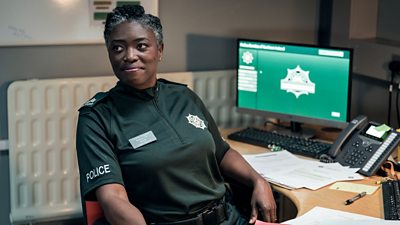
Can you set up the story in this series?
It’s about three rookies that join the PSNI and following their path as they battle their own challenges to becoming an officer. It’s really a story about relationships, in this very particular and unique set of circumstances and what they have to deal with on a day to day basis, that perhaps officers in different areas might not have to deal with.
What is it about Declan and Adam’s writing that has tapped into the psyche and culture of Northern Ireland and in particular the PSNI?
I can’t say specifically because I’m not from there, but what I got from the scripts is the level of detail and the level of care they’ve put in to ensure they’re not partisan in any way to the issues in Northern Ireland. I really liked the intelligence behind the writing. The plot is so woven in to the story of relationships that you almost feel like there’s no plot yet it’s fascinating to watch it unfold against the backdrop culturally of where Northern Ireland is. That’s testament to how brilliant the research, and the writing that’s come from that research, has been.
Describe how Sandra fits into the story of Blue Lights?
Sandra is married to Gerry, they met when he was running a riot training course. They joke that they fell in love over Molotov cocktails. Sandra is the main custody sergeant, the hub of the station. It’s a potential bottle neck, so she’s the one that keeps the suspects moving through the system, making sure that everyone gets booked in and processed. It’s the heart of the station so she interacts with everybody which was fun for me as an actor as you get to meet everybody.
How much did you know about the force in Northern Ireland and what research did you do?
I didn’t know a huge amount about where Northern Ireland was currently at. You see what’s reported in English news but that isn’t necessarily giving you the nuance of what is happening day to day. It was fascinating, upsetting, and eye-opening delving in to the history. Production were really helpful sending through documentaries to watch and articles to read so I dove in as much as I could. The head of the black policing association is based in Northern Ireland so I had a conversation with him, I spoke with a custody sergeant as well as watching a load of episodes of 24 Hours in Police Custody all of which were so helpful. You often see custody sergeants as gruff people who assume guilt, and actually they’re really fair so I wanted to bring that in to the character and the custody experience to be properly represented. As soon as you humanise people who can get dehumanised like politicians and police officers, it can immediately look more positive, you’ve made them more of a sympathetic person. We’re just telling a story about people in quite unique circumstances.
What can audiences expect from the series?
A completely different experience of a police drama, it’s not doing what a lot of police dramas do. It’s a refreshing take on a police drama. There’s not a lot of main stream shows set in Northern Ireland, it’s about time, I like this decentralisation of tv around the UK. It was such an eye-opening different world that I think people are going to really enjoy.
Interview with Declan Lawn and Adam Patterson (Writers, Co-Creators & Executive Producers)
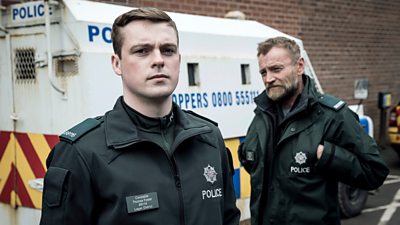
How did Blue Lights come about?
Declan: We were coming to the end of writing on our last BBC project, The Salisbury Poisonings and our old friend Louise Gallagher came to us with an idea focused around a woman who joins the police force aged 41 and we were intrigued by that. We were also really interested in the fact this would be a PSNI (Police Service of Northern Ireland) officer at the front of a contemporary drama set in Belfast and so Louise had us with the idea within about five minutes.
Adam: We had spent many years working in journalism and had told lots of stories but journalism tends to be about how the world works whereas in drama you can go much deeper into character. We felt that this was a great opportunity to tell a character-driven story in the place that we love, and to be allowed to write a drama for the BBC about a place we live in and love was impossible to say no to.
How did the concept originate?
Declan: The concept originated with the character of Grace Kennedy who, at 41, leaves the comfort of a steady job in social work and becomes a cop. However, when we started to research it we looked at the world of probationary police officers; trainees in the PSNI which we found so intriguing and decided to introduce a number of characters who are at different stages of life.
Adam: As with any other profession where you are a trainee you might be in a college environment or a learning institution but with the police force after an initial training period you suddenly find yourself on the street, with a gun, and it begs the question: how do normal people deal with that? And that’s what interested us.
What research did you conduct to help you create the story and how crucial was this research in developing the authenticity of the story?
Declan: As creators of television drama the research stage is everything to us and it might actually be our favourite part of the whole process. Our early careers were spent in investigative journalism and documentaries which is all about research so when we moved into drama we kept the same sensibilities. For Blue Lights the research stage took months and consisted of ride alongs in the back of police squad cars and spending time with retired and serving officers. The research part of creating this show was so satisfying. We want serving PSNI officers to watch it and to believe that we have represented their world authentically.
Adam: As journalists, in our previous lives we discovered the world is fascinating and that’s where our addiction to research comes from. If you are going to write fictional stories and characters that feel real why not meet people who do the job for real and in no precinct is that required more than if you are going to represent a police force and especially a police force in a post-conflict society like Northern Ireland. Our research stage gave us a back stage pass as to the mechanisms of how a police force works and added to that the responsibility of trying to tell that story well through a drama.
Blue Lights is set against the backdrop of policing in Northern Ireland – how did you incorporate your own experience of growing up in NI into the drama?
Adam: Declan and I grew up in Northern Ireland and then became journalists here and it’s a place we love dearly and a place that we felt was often misrepresented on TV. It’s also hard in some ways to make a story about your home because we are so close to it. I grew up with a member of the family in the prison service so there was always a gun nearby with all the security measures that came with that. It was all really normal and we just got on with it and dealt with it. It was only when I was a bit older that I realised that wasn’t normal. It made Declan and I intrigued as to how the police deal with in modern society. That’s why Blue Lights is about character and how normal people separate the job and the duty from then going home afterwards and distilling the things they have seen.
Declan: We drew on Adam’s experiences a lot growing up in a house with a gun nearby and that sense of threat and all of that going on in the background of growing up in NI. Police still check under their cars, and they still tell their children not to tell anyone that their mother or father is a police officer.
Adam: That is what distinguishes being a cop in NI from being a cop elsewhere in the UK and how does that impact on a family dynamic when you are telling your child to lie about your job. This is a job you take home with you and when you train for this job you are told that but you don’t really understand it until you start working as a police officer. I think I’ve spent my life trying to work it out and I feel thankful that I’ve now found the dramatic medium as a way to express a lot of the questions I had as a result of my own experiences. We are just trying to channel that into a good drama that I hope is compulsive and exciting to watch.
Why did you want to tell the story of three new recruits?
Declan: It’s a really interesting time to set a drama now in Northern Ireland. This place has been in the news a lot in the last five years as a result of Brexit. There is political instability here as a result of that. But there’s also a sense more globally of people having a grim and cynical sense of all institutions and a slightly cynical sense of where we are all going as a global family. We wanted to tell that story of people who are more or less, most of the time just trying to do good and they screw up and mess up in really big ways. We wanted to explore a big organisation made up of people trying to do their best.
Adam: You have to ask yourself how people who grew up during the Troubles survived. They found resilience because they had to and they found that with an acerbic wit and with humour and discovering that the small things in life are what really matter. In some police shows a cop puts on a uniform and becomes heroic by nature and what we are trying to do is show that heroism is much more ordinary and if you work hard enough with the right people you can achieve extraordinary things.
Declan: There is something redemptive in this show. It is gritty and violent but ultimately it is redemptive, hopeful and optimistic.
What other themes does the series explore?
Declan: This is a series about consequences, both long-term and short-term. Long term it is about trans-generational trauma so even though the Troubles are over, it is right to say they are in the DNA of this show. It’s also about the consequence of the tiny decisions we make every day. There’s a line at the heart of the show where Helen asks Annie what she thinks of the job and Annie responds saying that she thinks the decisions they make are important. Those decisions we all make, and in particular, these policemen and women are like butterfly wings that could cause a hurricane – they can really change the world. The unifying theme for me is consequence and as we build towards the climax in eps five a six you can trace everything that happens back to tiny little events that happen in episodes one and two.
Adam: Declan and I have a view of the world that there is truth and decency everywhere. Some of the people we meet in the show are doing bad things but hopefully with the way we’ve written the characters you spend enough time with them to see that it’s not just good and bad. There’s a lot of complexity there and bad people can do good things and vice versa. If you approach a show with that character mentality hopefully we can show that we are all quite similar and despite our flaws, if we work together, we can make the world a slightly better place.
Interview with Gilles Bannier (Director & Executive Producer)
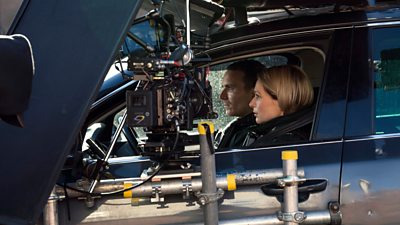
How did you become involved in Blue Lights?
When I started to read the first episode I couldn’t stop. By the end of the first script I was already convinced by the brilliant writing and so I jumped into episode two and it was even better. At that point I committed to directing them all.
What was the research process that went into the series and why was it essential to the authenticity of the story?
Writers, Adam Patterson and Declan Lawn and myself come from a documentary background. Being the outsider, and not knowing anything about the place it took me a while to get all the nuances big or small of this unique part of the world and history. It took me some time to get to grips with the place and I wanted to really know what I’m talking about. I spent weeks with the production designer and location manager visiting police stations around Northern Ireland trying to understand the unique situation in NI but there was no other way to make the show without this kind of level of detail.
What was your vision for the series and how did you develop your vision and style?
It was quite challenging to find my personal vision for this show because it is so character driven. There is no ‘whodunnit’ or intricate plot and so it’s all about emotions and character interaction and as such, it was not easy to find a really defining visual concept for the show. I soon realised I had to put my director’s ego to one side and learn to address what we needed to make the show work as a character-driven story. The challenge was to dig into the depth of the characters while still including some high-concept, sweeping, beautiful imagery of the city. I wanted to show Belfast in a different way to that which is generally shown and step away from the black and white representation of Belfast = Troubles and find a new way to incorporate the city without betraying it. It was a fantastic challenge.
Describe the characters in Blue Lights?
Blue Lights is an ensemble piece primarily about three rookie cops and their various mentors. Declan and Adam have written these three recruits without any cynicism and with an element of innocence and naivety. In this unique place, Northern Ireland, which has suffered so much violence for many years a little bit of innocence and purity was so wonderful to try to introduce within these characters and story. The casting process for the ten main roles was an absolute joy.
How does telling the story through the POV of three rookie officers add to the drama?
Having our three lead characters as probationary constables was an inspired decision because they still don’t know if they are going to pass their exams and stay in the PSNI. It was a brilliant opportunity to present these anti-heroes who are full of flaws, don’t know what they are doing and are still learning the ropes. Matching them with mentors who are experienced, seasoned cops provides a great starting point to explore the relationships and journeys in a character drama.
What themes are at the heart of Blue Lights?
The themes that run through the show are how you pass the baton to the next generation and how the generation that is reaching the end should share the experience. In NI it is so important that people should share their experience and yet let the younger generations make decisions for themselves. It’s also about finding the glorious and terrible messiness of human nature in these characters. It’s about the clash of generations beautifully written by Declan and Adam.